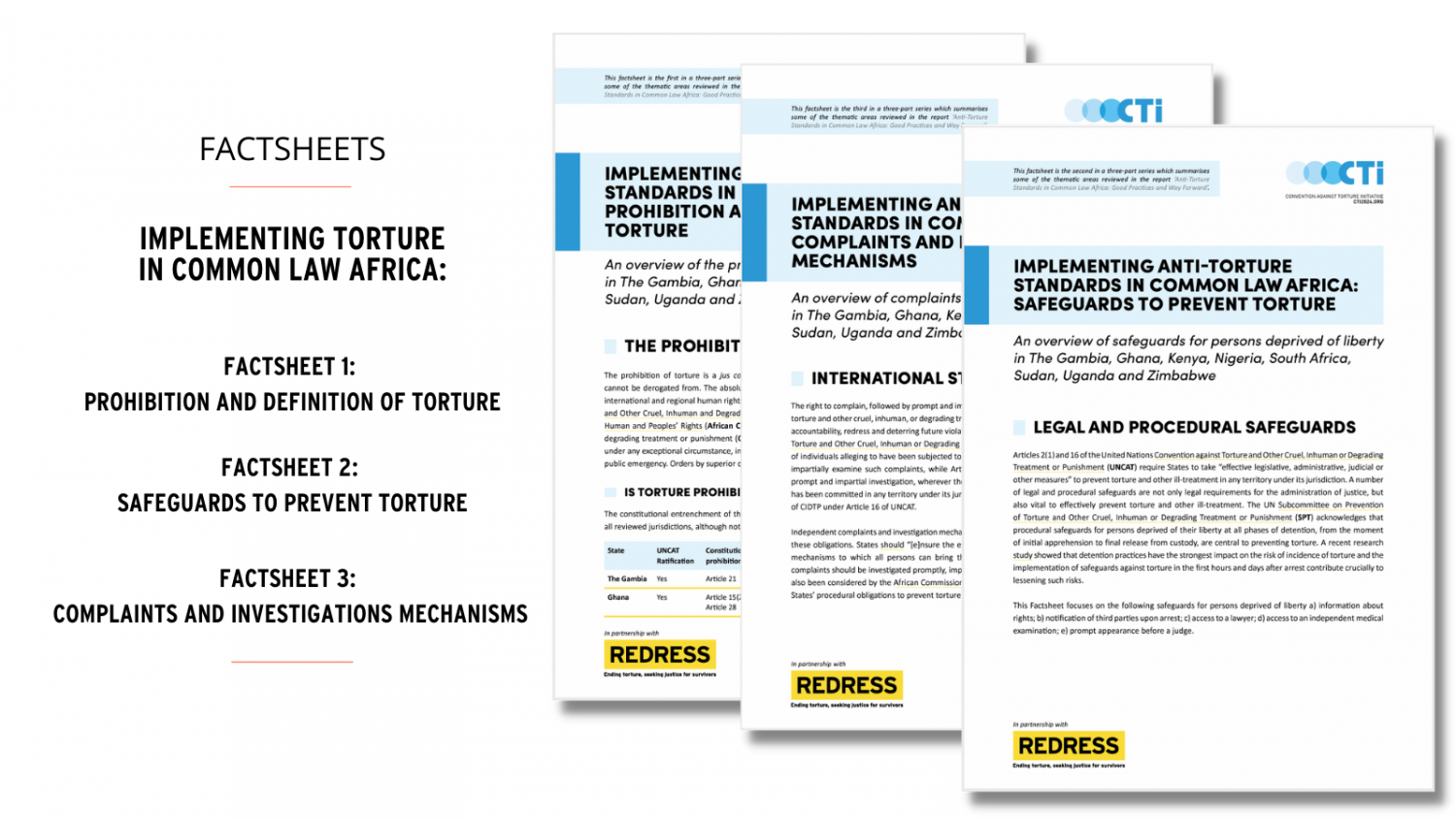
Anti-Torture Standards in Common Law Africa: Quick Facts
The Convention against Torture Initiative (CTI) and REDRESS published a three-part series of factsheets which summarises the key thematic areas reviewed in the recent report titled ‘Anti-Torture Standards in Common Law Africa: Good Practices and Way Forward’.
The factsheets review the anti-torture legal and regulatory frameworks in The Gambia, Ghana, Kenya, Nigeria, South Africa, Sudan, Uganda and Zimbabwe. Specifically, the three factsheets analyse:
1. The extent to which the reviewed States have domesticated the definition and prohibition of torture in line with UNCAT.
- Torture is prohibited under the Constitution of all eight States. It is also criminalised as a separate offence in Kenya, Nigeria, South Africa, and Uganda, where domestic definitions of torture are mostly in line with the UNCAT definition, and specifically its four elements: (1) severe pain or suffering; (2) the element of intent; (3) the existence of a specific purpose; and (4) the public official requirement.
- Shared challenges were identified in the way torture and other cruel, inhuman or degrading treatment or punishment (CIDTP) are defined and prosecuted in domestic systems. For example, some States do not criminalise torture as a separate criminal offence; others criminalise torture and other ill-treatment under the same offence; and some States also have in place procedural barriers to accountability for torture, including immunities, amnesties, and statutes of limitation.
- See more here: Factsheet 1: Prohibition and Definition of Torture
2. The implementation of safeguards against torture for persons deprived of their liberty across the eight States reviewed.
- Most of the States studied have enacted the following safeguards against torture to varying degrees: (a) information about rights; (b) notification of third parties upon arrest; (c) access to a lawyer; (d) access to an independent medical examination; and (e) prompt appearance before a judge. This Factsheet analyses the degree to which these are observed, in what manner, and how existing regional and international standards can be used to improve domestic legal protections and the practice in this regard.
- States face shared challenges in implementing such standards, including legal and practical limitations, such as not informing persons deprived of their liberty of their rights in a language or manner that they can understand, financial limitations in places of detention, or procedural issues limiting instances in which detained persons can communicate with lawyers, relatives or medical personnel, among others.
- See more here: Factsheet 2: Safeguards to Prevent Torture
3. And an overview of existing mechanisms that receive complaints of and investigate allegations of torture and other ill-treatment in the eight States reviewed.
- All States have in place, to some extent, procedures to receive and investigate complaints against public officials (such as police officers, prison officials, and other security officers in detention facilities). All reviewed States also have in place National Human Rights Institutions which are mandated to receive and investigate allegations of human rights abuses, including torture.
- Many of the States researched face shared challenges, such as lack of independence of the relevant bodies and authorities, lack of training, and limited resources.
- See more here: Factsheet 3: Complaints and Investigation Mechanisms
All three Factsheets outline a number of proposals for States and their institutions, in response to the shared challenges identified.
You can read the full report here.
